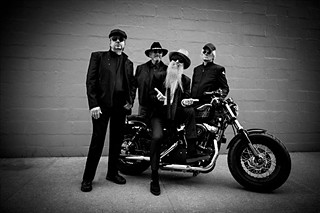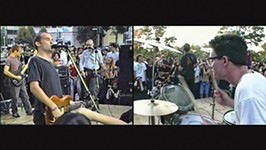Moving Sidewalks
Sun., 11pm, Reverberation stage
By Tim Stegall, Fri., April 26, 2013
The YouTube footage looks familiar, but slightly tweaked, like some alt-universe Star Trek episode.
Onstage, a lean figure in an impressively tailored suit ('cuz every girl's crazy about a sharp-dressed man), wide-brimmed hat, and flowing, rabbinical beard known the world over grins beneath his Ray-Bans, squeezing barbecue blues runs from what looks like a Silly Putty impression of a Telecaster, stalking the stage front in that Texas gunslinger manner, barking like a 90-year-old cotton picker at the mic.
More guys in black suits, shades, and hats, including a bassist pulling low-end beef from a matching instrument, back him. Behind them rises a matching wall of Magnatone amps, unavailable for years, resplendent in Fifties hot-rod styling. An iPad inlaid on the frontman's guitar contorts colors like a digital lava lamp as an organist thickens the sound. It's heavy, menacing, psychedelic.
"I think we've stumbled into one of life's unexpected pleasures," chuckles Billy Gibbons from his New York hotel room two days later. "A real rewarding turn of events, shall we say?"
No, not ZZ Top. Try the Moving Sidewalks, the Houston acid/garage quartet that launched Gibbons' career. Only this isn't some 1968 auditorium famously warmed up for Jimi Hendrix. Last month, on March 30, the Moving Sidewalks performed for the first time since that ill-fated year – at B.B. King's Blues Club & Grill in Manhattan. Gibbons, bassist Don Summers, organist Tom Moore, and drummer Dan Mitchell certainly don't sound like a band interrupted.
"I think," affirms Gibbons in his deliberate drawl, "what started this unexpected return was the success of the reissue of the Sidewalks' first and only album, from 1969."
Flash, released after the band had broken up once Summers and Moore were drafted and sent to Vietnam, was a radical departure from the era's garage-punk, with snot-bomb singles like "99th Floor." A hint of what was to come appeared on August 1968's stopgap 7-inch, a proto-stoner-rock reworking of the Beatles' "I Want to Hold Your Hand," heavy enough to make granite sound like tissue. Every such track, plus outtakes – including Gibbons and Mitchell's earlier recordings in the Coachmen – were collated on last fall's 2-CD The Complete Collection. Bill Bentley, who annotated the release in part because of his Houston teenhood as a Sidewalks fan, says Flash's heavy psych caught the band's fanbase by surprise.
"They made that over a pretty long period," says Bentley, "but we just knew them from the first two singles. They didn't play the album material live. So by the time the album came out and they weren't together anymore, it wasn't so much anticlimatic as, 'Who is this?!'"
"Was there any stronger influence than Roky Erickson's outfit, the 13th Floor Elevators?" asks Gibbons of the Coachmen's morphing into the Moving Sidewalks of Flash. "They turned a corner that nobody had anticipated, and when I experienced it firsthand, I said, 'That is the way!' The Sidewalks today unabashedly admit to following as best we could alongside the 13th Floor Elevators. Those guys were tearing it up! The cerebral jostling that they were stirring was truly mind-bending."
Drummer Dan Mitchell hastens to point out Gibbons' blues background, as well as his own time spent in New Orleans, absorbing the local soul of Benny Spellman, Ernie K-Doe, and Irma Thomas.
"Those acts were actually playing high school parties," Mitchell enthuses. "I just flipped out when I heard those bands perform live. It impacted us when Billy and I got together."
Hence the transformation from a teen band playing Rolling Stones and R&B covers in matching suits at church halls to a mind-frying psych act opening shows across Texas for Hendrix, the Doors, and the Jeff Beck Group. The penchant for showmanship that followed Gibbons into ZZ Top via Don Summers inventions like the spinning bass and a fur-lined square guitar certainly helped. Catching the Doors' amps on fire one night in Dallas due to a pyrotechnic effect that Hendrix himself suggested when the Sidewalks toured with him didn't.
When the Army co-opted half the band, Gibbons and Mitchell put together the first ZZ Top lineup. We all know what happened after the latter left and Frank Beard and Dusty Hill came aboard. Mitchell later rejoined Tom Moore in "a Texas boogie band," while Summers went on to build custom guitars for an elite clientele like the Who's John Entwistle. When The Complete Collection sold well last year, a New York promoter contacted Mitchell.
"The promoter asked him, 'Hey, do you think you could get Billy to join you for a Moving Sidewalks duo, kind of like Jack White or the Black Keys?'" reveals Gibbons. "And Dan said, 'Well, why not include the other two?' The guy dropped! He said, 'What, are you serious?' 'Heck, yeah! We're all still buddies!'
"We knew in the first 10 seconds," says the guitarist of subsequent rehearsals. "It was like we were in 1969 again. The delivery was heavier, more deliberate. It got a little meaner along the way. But I think that's a good thing."
And so, exactly two reunion shows were scheduled: NYC and Austin Psych Fest.
"We had four weekends to rehearse," adds Gibbons. "During those rehearsals, we were actually making up new songs. So, I'm gonna take them into the studio the last two weeks of this month and present a series of new recordings. And I hope you would agree that such an offering is not only a service for the friends, fans, and followers, but it will add an air of legitimacy that would eclipse the curiosity factor and even the novelty factor. This is some serious stuff."









